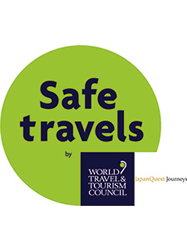JapanQuest Journeys Welcomes Back Luxury Travelers to Japan
Posted on April 28, 2011 within Press
(Washington, DC and Tokyo, Japan, April 28, 2011)
JapanQuest Journeys, the premier destination management company for Japan, welcomes luxury travelers back as Japan’s doors open once again. Most of Japan’s major tourist areas, transportation systems and food supplies were unaffected by the earthquake and tsunami and are safe and fully available for travel and enjoyment. Co-Founders Scott Gilman and Philip Rosenfeld are pleased to announce that JapanQuest Journeys will resume offering the very best of Japan, a truly extraordinary country, to its clientele.
JapanQuest Journeys is known for its bespoke “tailor-made” luxury journeys exclusively to Japan and its unique access to the very best Japan has to offer. JapanQuest Journeys works directly with high-end individuals and serves top travel consultants and institutions worldwide. Our in-country presence ensures immediate access to local resources to service client needs.
According to Rosenfeld based in Tokyo, “A sense of normalcy has returned to most of Japan. In the days and weeks following the earthquake and tsunami that struck the Tohoku region of northern Japan on March 11th, a feeling of self-restraint prevailed as a nation came together to lend its support to those individuals affected by the disaster. This support will of course continue in the months and years ahead. However, there is a sense throughout Japan that it is time to move forward, for people to return to their daily routines as a spiritually strong and economically reinvigorated nation is what is needed most to rebuild the lives of those individuals in the affected areas.
People are once more dining out with many restaurants in Tokyo and other areas full with customers and Japanese will again be traveling domestically as the Golden Week holiday begins next week. Professional baseball, which proved to be cathartic in the United States in the wake of 9/11, is underway and people are taking time to enjoy themselves. In essence, the Japanese people have realized that returning to their normal lives is the best way for them to help their fellow citizens in need and traveling to Japan is one of the primary means through which you too can help and show your support for the Japanese people.”
Gilman further comments that “if one were to overlay a chart on a map of Japan encompassing the predominant destinations that travelers traditionally visit, it would include Tokyo then on through Nagano to the western coastline to Kanazawa and throughout the southern, western and eastern regions stretching to the island of Kyushu. In the north, tourism would be focused on the island of Hokkaido. These destinations are far from the impacted areas in Tohoku including the Fukushima Daiichi Power Plant. “
The U.S Department of State has downgraded its travel alert stating that health and safety risks are low and do not pose significant risks outside a defined 50 mile/80 kilometer radius around the Fukushima Daiichi Power Plant which lies approximately 185 miles/300 kilometers north of Tokyo. Other governments have also updated their travel advisories to more accurately reflect the status of the country in terms of safety and security. The Japan National Tourism Organization has also resumed promoting tourism to Japan.
According to Gilman and Rosenfeld, “Japan is an amazing venue to journey to and those seeking to travel there should not be dissuaded by the events that transpired in the northern part of Honshu. Although tragic, virtually everywhere luxury travelers venture is unscathed and available for an extraordinary journey.”
“We encourage travelers to start planning now for their journey and see the wonders Japan has to offer in the upcoming seasons.”
To contact JapanQuest Journeys, please visit its web site at https://www.japanquestjourneys.com, call us at 202-455-0095 (Washington, DC) or email us at info@japanquestjourneys.com.
About JapanQuest Journeys
JapanQuest Journeys is a boutique firm specializing in bespoke “tailor-made” luxury journeys to Japan with an unparalleled and undiluted single-country focus. With offices in the US and Japan, we deliver a wealth of unique Japanese expertise based upon decades of first-hand experiences and an intimate understanding of the cultural, historic and modern landscape. We will share extraordinary experiences and insider access — making available the “real”Japan through an extensive network of locally cultivated relationships.
Source: JapanQuest Journeys
Scott Gilman
Philip Rosenfeld
info@japanquestjourneys.com
Phone: 202-455-0095
https://www.japanquestjourneys.com
JapanQuest Journeys Welcomes Luxury Travelers Back to Japan
Posted on April 26, 2011 within News
JapanQuest Journeys, the premier destination management company for Japan, welcomes luxury travelers back as Japan’s doors open once again.
Please download and glance at our Flyer—JapanQuest Journeys Welcomes Luxury Travelers Back to Japan where we provide important travel information, insight into current conditions and why Japan continues to be a compelling destination for luxury travelers.
Important Travel Information from JapanQuest Journeys’ Tokyo Office
Most of Japan’s major tourist areas, transportation systems and food supplies were unaffected by the earthquake and tsunami and are safe and fully available for travel and enjoyment.
The U.S Department of State has downgraded its travel alert stating that health and safety risks are low and do not pose significant risks outside a defined 50 mile/80 kilometer radius around the Fukushima Daiichi Power Plant which lies approximately 185 miles/300 kilometers north of Tokyo. Other governments have also updated their travel advisories to more accurately reflect the status of the country in terms of safety and security.
The Japan National Tourism Organization has resumed promoting tourism to Japan.
JapanQuest Journeys also provides highlights of Japan’s demographics and geography along with the proximity of major tourist destinations.
The Japan National Tourism Organization (JNTO) and Partner of JapanQuest Journeys Announces it has Resumed Promoting Tourism to Japan
Posted on April 21, 2011 within News
JNTO President: JNTO Resumes Tourism Promotion
New York, NY, April 20, 2011 As the situations in Japan have been assessed by various governments and international authorities as stable, the President of Japan National Tourism Organization Mr. Tadatoshi Mamiya announced that JNTO is to resume promoting tourism to Japan>.
It is now just over a month since the earthquake and tsunami hit the coast of the Tohoku region in Japan. We are very grateful for the generous contributions and support that we have received from all over the world. The support has been very important to us, and the Japanese people are determined to put all our efforts into recovery actions, in response to the outpouring of encouragement and solidarity that we have received from the global community.
The Japan National Tourism Organization will support the rebuilding efforts by continuing to pursue our mission to positively promote Japan as a vibrant, beautiful destination, brimming with unique cultural attractions, exciting cities, and friendly people.
We will continue to distribute the latest detailed and accurate information about travel to Japan, as well as to actively develop our promotional activities in order to encourage many people to visit Japan. To this end, your support and cooperation are indispensable.
Most of Japan’s regions were unaffected by the earthquake, and we invite you to see the present condition of Japan for yourselves. We invite the world’s media and tourism professionals to visit Japan, and to observe first-hand how Japan is still a unique and attractive travel destination.
Japan is now entering a beautiful season of new spring flowers and scenery. We continue to welcome visitors from all over the world with an unchanging spirit of hospitality, as we have always done. We will strive to encourage even more tourists to visit Japan, and when they do, the people of Japan will thank them for their messages of encouragement, prayers, and support that are helping the nation to recover from this disaster.
Sincerely,
Tadatoshi Mamiya
President
Japan National Tourism Organization
JNTO continues to provide daily updates on its website and its New York and Los Angeles offices take inquires. At the same time, tourism promotion is back to normal for entire country except for the affected areas in the Tohoku region.
For more information contact:
Nori Akashi, Public Relations Manager
nakashi@jntonyc.org
JapanQuest Journeys Reports on United States Department of State Update on Traveling to Japan
Posted on April 15, 2011 within News
United States Department of State
Bureau of Consular Affairs
Washington, DC 20520
JAPAN
April 14, 2011
This Travel Alert replaces the Travel Warning for Japan dated March 31, 2011. This Travel Alert expires on June 15, 2011.
The assessment of technical and subject matter experts across United States Government agencies is that while the situation at the Fukushima Daiichi plant remains serious and dynamic, the health and safety risks to areas beyond the 50 mile evacuation zone, and particularly to Tokyo, Nagoya (Aichi Prefecture), Yokohama (Kanagawa Prefecture) nearby U.S. military facilities and the prefectures of Akita, Aomori, Chiba, Gunma, Iwate, Nagano, Niigata, Saitama, Shizuoka, Tochigi, and Yamanashi, and those portions of Fukushima, Ibaraki, Miyagi and Yamagata prefectures which are outside a 50 mile radius of the Fukushima Daiichi nuclear power plant are low and do not pose significant risks to U.S. citizens.
This analysis takes into consideration both various age groups and the classification of the severity of the situation at Fukushima Daiichi as a Level 7 event by the Government of Japan, which reflects what has transpired since the initial incident and the potential long-term effects in the area surrounding the plant.
This assessment reflects inputs from our national laboratories as well as the unanimous opinion of the U.S. scientific experts on the ground in Japan. Furthermore, they are consistent with practices that would be taken in the United States in such a situation. Based on the much reduced rate of heat generation in the reactor fuel after one month of cooling and the corresponding decay of short-lived radioactive isotopes, even in the event of an unexpected disruption at the Fukushima Daiichi plant, harmful exposures to people beyond the 50 mile evacuation zone are highly unlikely, and there would be a significant amount of time to best assess any steps that might have to be taken.
The situation at the plant is dramatically different today than it was on March 16, when we saw significant ongoing releases of radioactivity, the loss of effective means to cool the reactor cores and spent fuel, the absence of outside power or fresh water supply for emergency management, and considerable uncertainty about the condition of the site. Today, while the situation remains serious, and there is still a possibility of unanticipated developments, cooling efforts are ongoing and successful, power, water supply, and back-up services have been partially or fully restored, and planning has begun to control radioactive contamination and mitigate future dangers. Our coordination with the Japanese is regular and productive, and we have a greatly increased capacity to measure and analyze risks.
The Department of State has lifted Voluntary Authorized Departure, allowing dependents of the U.S. government employees to return to Japan.
We continue to recommend that U.S. citizens avoid travel within the 50-mile radius of the Fukushima Daiichi Nuclear Plant. U.S. citizens who are still within this radius should evacuate or shelter in place.
Japan is one of the most seismically active places in the world. Tokyo and areas to the Northeast continue to experience strong aftershocks related to the March 11 earthquake. Aftershocks following an earthquake of this magnitude can be expected to continue for more than a year. Identifying potential hazards ahead of time and advance planning can reduce the dangers of serious injury or loss of life from an earthquake. See the Embassy Website for detailed information on earthquake safety:
http://japan.usembassy.gov .
————————-
American Citizen Services
————————-









